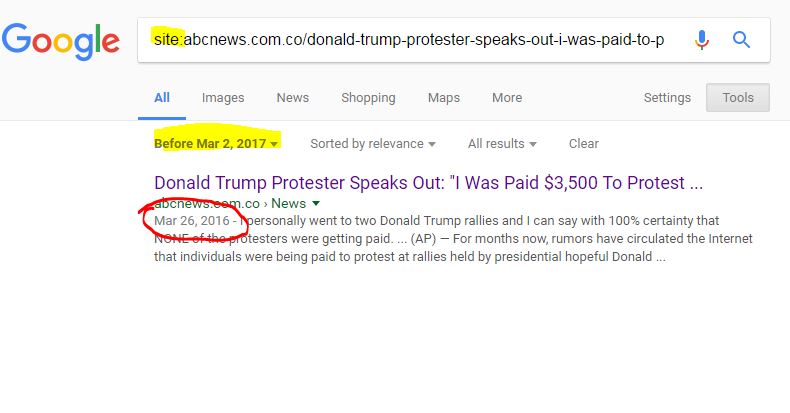34
Many pages will tell you the date they were published. But some pages don’t give publication dates, and some can’t be trusted.
Take, for example, this story from fake site ABCNews.co (a hoax site that attempts to to look like an ABC news site).

You’ll note that the publication date was November 11.
That’s what the site looks like today. But we can see what it looked like previously, courtesy of archive.org‘s Wayback Machine.
Here’s what it looked like in March, sporting a publish date of March 24:

Here it is in June, sporting a date of June 16:

And in September, it sported a date of September 11:

Hoax sites often do this date incrementation to increase the share rate on older stories. People are more likely to share things if they believe they are breaking news and not yesterday’s story.
So how do we get some sense of when this story was first published?
We can’t get there exactly but we can often use Google to get close. Google stores the date of the first time it indexed a page–on popular sites this date is usually within a couple days of the true publish date (on unknown sites it is much less reliable).
To get Google to show the indexed date of a page, you’ll need to do two things:
- Set up a search that will only return that particular page by using the “site:” search term
- Trigger display date but setting a date range that ends with the current day.
Here’s what that looks like in this case:

As you can see, we’ve taken the URL of the page and entered the following as the search term:
site:abcnews.com.co/donald-trump-protester-speaks-out-i-was-paid-to-protest/
Then we’ve used date filtering to create a filter that doesn’t exclude anything (its date range is all possible dates), but triggers this sort of date display in Google.
Again, this is not a rock-solid publication date, but we can say that there was some content at this URL at this date, and in most cases, with a URL like this, that means the story was up by then.

